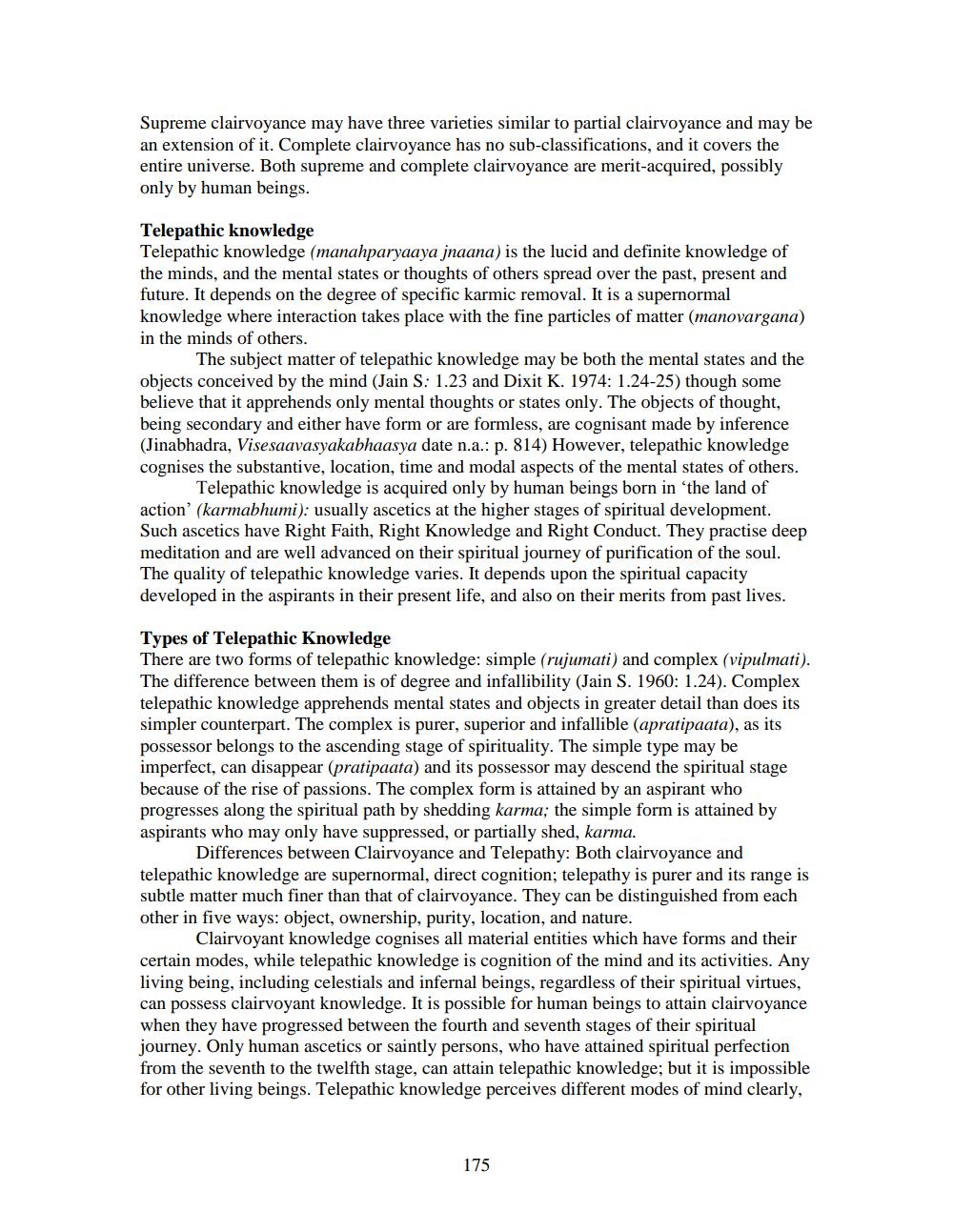________________
Supreme clairvoyance may have three varieties similar to partial clairvoyance and may be an extension of it. Complete clairvoyance has no sub-classifications, and it covers the entire universe. Both supreme and complete clairvoyance are merit-acquired, possibly only by human beings.
Telepathic knowledge
Telepathic knowledge (manahparyaaya jnaana) is the lucid and definite knowledge of the minds, and the mental states or thoughts of others spread over the past, present and future. It depends on the degree of specific karmic removal. It is a supernormal knowledge where interaction takes place with the fine particles of matter (manovargana) in the minds of others.
The subject matter of telepathic knowledge may be both the mental states and the objects conceived by the mind (Jain S: 1.23 and Dixit K. 1974: 1.24-25) though some believe that it apprehends only mental thoughts or states only. The objects of thought, being secondary and either have form or are formless, are cognisant made by inference (Jinabhadra, Visesaavasyakabhaasya date n.a.: p. 814) However, telepathic knowledge cognises the substantive, location, time and modal aspects of the mental states of others. Telepathic knowledge is acquired only by human beings born in 'the land of action' (karmabhumi); usually ascetics at the higher stages of spiritual development. Such ascetics have Right Faith, Right Knowledge and Right Conduct. They practise deep meditation and are well advanced on their spiritual journey of purification of the soul. The quality of telepathic knowledge varies. It depends upon the spiritual capacity developed in the aspirants in their present life, and also on their merits from past lives.
Types of Telepathic Knowledge
There are two forms of telepathic knowledge: simple (rujumati) and complex (vipulmati). The difference between them is of degree and infallibility (Jain S. 1960: 1.24). Complex telepathic knowledge apprehends mental states and objects in greater detail than does its simpler counterpart. The complex is purer, superior and infallible (apratipaata), as its possessor belongs to the ascending stage of spirituality. The simple type may be imperfect, can disappear (pratipaata) and its possessor may descend the spiritual stage because of the rise of passions. The complex form is attained by an aspirant who progresses along the spiritual path by shedding karma; the simple form is attained by aspirants who may only have suppressed, or partially shed, karma.
Differences between Clairvoyance and Telepathy: Both clairvoyance and telepathic knowledge are supernormal, direct cognition; telepathy is purer and its range is subtle matter much finer than that of clairvoyance. They can be distinguished from each other in five ways: object, ownership, purity, location, and nature.
Clairvoyant knowledge cognises all material entities which have forms and their certain modes, while telepathic knowledge is cognition of the mind and its activities. Any living being, including celestials and infernal beings, regardless of their spiritual virtues, can possess clairvoyant knowledge. It is possible for human beings to attain clairvoyance when they have progressed between the fourth and seventh stages of their spiritual journey. Only human ascetics or saintly persons, who have attained spiritual perfection from the seventh to the twelfth stage, can attain telepathic knowledge; but it is impossible for other living beings. Telepathic knowledge perceives different modes of mind clearly,
175




